英语专业毕业论文--论萧伯纳《皮格马利翁》中伊莉莎的女性独立
从伯格森创造进化论视角探析《皮格马利翁》中卖花女伊莉莎变形的内外因素
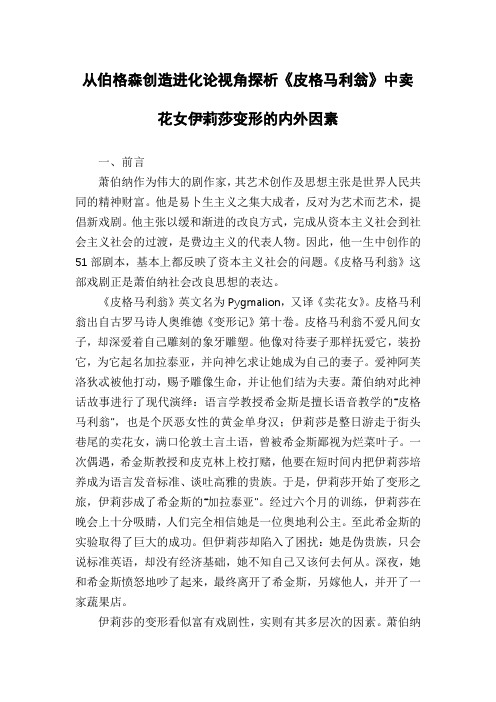
从伯格森创造进化论视角探析《皮格马利翁》中卖花女伊莉莎变形的内外因素一、前言萧伯纳作为伟大的剧作家,其艺术创作及思想主张是世界人民共同的精神财富。
他是易卜生主义之集大成者,反对为艺术而艺术,提倡新戏剧。
他主张以缓和渐进的改良方式,完成从资本主义社会到社会主义社会的过渡,是费边主义的代表人物。
因此,他一生中创作的51部剧本,基本上都反映了资本主义社会的问题。
《皮格马利翁》这部戏剧正是萧伯纳社会改良思想的表达。
《皮格马利翁》英文名为Pygmalion,又译《卖花女》。
皮格马利翁出自古罗马诗人奥维德《变形记》第十卷。
皮格马利翁不爱凡间女子,却深爱着自己雕刻的象牙雕塑。
他像对待妻子那样抚爱它,装扮它,为它起名加拉泰亚,并向神乞求让她成为自己的妻子。
爱神阿芙洛狄忒被他打动,赐予雕像生命,并让他们结为夫妻。
萧伯纳对此神话故事进行了现代演绎:语言学教授希金斯是擅长语音教学的“皮格马利翁”,也是个厌恶女性的黄金单身汉;伊莉莎是整日游走于街头巷尾的卖花女,满口伦敦土言土语,曾被希金斯鄙视为烂菜叶子。
一次偶遇,希金斯教授和皮克林上校打赌,他要在短时间内把伊莉莎培养成为语言发音标准、谈吐高雅的贵族。
于是,伊莉莎开始了变形之旅,伊莉莎成了希金斯的“加拉泰亚”。
经过六个月的训练,伊莉莎在晚会上十分吸睛,人们完全相信她是一位奥地利公主。
至此希金斯的实验取得了巨大的成功。
但伊莉莎却陷入了困扰:她是伪贵族,只会说标准英语,却没有经济基础,她不知自己又该何去何从。
深夜,她和希金斯愤怒地吵了起来,最终离开了希金斯,另嫁他人,并开了一家蔬果店。
伊莉莎的变形看似富有戏剧性,实则有其多层次的因素。
萧伯纳将社会整体的改良寄托于社会个体的进化,这基本上遵循萧伯纳缓和渐进的费边主义改造方式,而这种个体进化的方式,则深受伯格森创造进化论的影响。
下面笔者将简要地叙述伯格森创造进化论的主要观点。
二、伊莉莎变形的内外因素探析伊莉莎原是伦敦的卖花女,经过希金斯教授的语言训练,伦敦土言土语进化成了标准的皇室英语,这一语言进化的过程,不仅有希金斯教授提供的夜以继日的训练,而且还有伊莉莎自身主动学习标准英语的要求。
《皮格马利翁效应》读后感

《皮格马利翁效应》读后感英文回答:The Pygmalion Effect is a psychological phenomenon that suggests that our expectations can have a significant impact on the behavior and outcomes of others. In other words, if we believe someone is capable of great things, they are more likely to live up to our expectations. This effect has been demonstrated in a variety of settings, from education to the workplace.In the classic play "Pygmalion" by George Bernard Shaw, the protagonist, Professor Henry Higgins, makes a bet that he can transform a poor flower girl named Eliza Doolittle into a proper lady. Higgins' expectations for Eliza are so high that she eventually begins to believe in herself and transforms into the elegant woman he envisions.I have witnessed the Pygmalion Effect firsthand in my own life. As a teacher, I have seen how students who aregiven high expectations are more likely to succeed. I have also seen how students who are constantly criticized ortold they are not capable of success often give up.The Pygmalion Effect is a powerful reminder that our words and actions can have a significant impact on thelives of others. If we believe in someone, we can help them to achieve great things.中文回答:读了《皮格马利翁效应》这本书,我受益匪浅。
萧伯纳作品赏析Pygmalion
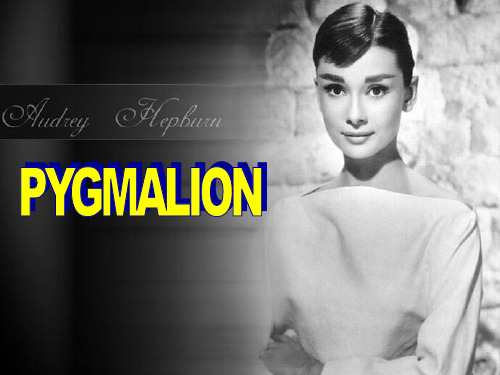
Literary Career and Achievements
the second greatest English playwright behind only Shakespeare
“a day never passes without a performance of some Shaw play being given somewhere in the world.”
Higgins :Good -bye , be sure you try on that small talk at
the three at-homes.Don' t be nervous about it .Pinch it in
strong . (希金斯:再见, 在那三个茶会上你一定要试试这种时髦 话。不要胆怯, 尽管说。)
With wondrous art, he creates a beautiful statue in ivory, Galatea, representing feminine ideal.
When Pygmalion returns home, he kisses his statue and is delighted to find that she is warm and soft to touch.
He asks the Greek Goddess to bring her to life.
His wish is granted.
Do you heard of “the Pygmalion EfTfehcet”P?ygmalion Effect (皮格马利翁效应)
is that people tend to behave as you expect they will. If you expect a person to take responsibility, they probably will. If you expect them not to even try, they probably won’t.
戏剧皮格马利翁女主人物分析

戏剧皮格马利翁女主人物分析作品《皮格马利翁》讲述了一个相貌清丽出身贫寒的街头卖花女伊莉莎,通过接受语言学家西斯金的六个月语言训练以及上流社会的礼仪学习,成功地转变谈吐高雅,仪态端庄的贵族小姐。
而伊莉莎在经历身份转变过程中,对之前认同的自身身份迷惘困惑,并因此寻求身份的重新界定。
前人对于该作品的讨论主要集中在该剧的女性主义批评,存在主义批评以及原型批评等,而伊莉莎在身份探求以及身份认同的问题上并没有得到太多关注。
有鉴于此,本文试图运用身份认同相关理论来探究《皮格马利翁》中伊莉莎的身份问题以及伊莉莎转变之后的身份构建问题,进而挖掘萧伯纳剧作的社会道德意义。
论文分为五个部分。
第一部分介绍了作者乔治·萧伯纳和他的《皮格马利翁》、相关的社会认同理论、国内外对于作品作家的研究现状,研究的视角以及本文的结构。
第二章从社会分类,社会比较和积极区分三个方面探究作为社会底层的卖花女的伊莉莎的身份问题。
伊莉莎属于英国底层阶级的一员。
本章介绍伊莉莎在早期中对所属群体和社会环境的认同。
第三章根据身份危机理论介绍了伊莉莎的身份危机的缘由,身份危机的呈现以及身份危机带来的后果。
第四章通过伊莉莎从卖花女到一个淑女的转变以及影响伊莉莎转变成功的因素来探讨伊莉莎成功的社会构建。
第五章结论部分总结出伊莉莎的成长过程其实就是她确立个人身份,追求自我价值的过程。
通过讲述维多利亚时期卖花女伊莉莎在寻求自我身份认同中所经历的阶级地位的流动,以及在探求过程中出现的身份认同的危机和随之而来的困境,作品深刻地探讨了维多利亚时期下人们的身份认同问题,以及从中反映出来的社会伦理问题。
伊莉莎身份认同的过程正是自我确立身份,追求人生价值的过程,萧伯纳给予此剧开放式的结尾更是展示了萧伯纳对于个体在身份认同过程中能够改变自身命运能力的信心,这同时也是《皮格马利翁》的社会道德意义所在。
从女性主义视角解读《匹格马利翁》中女主人公形象
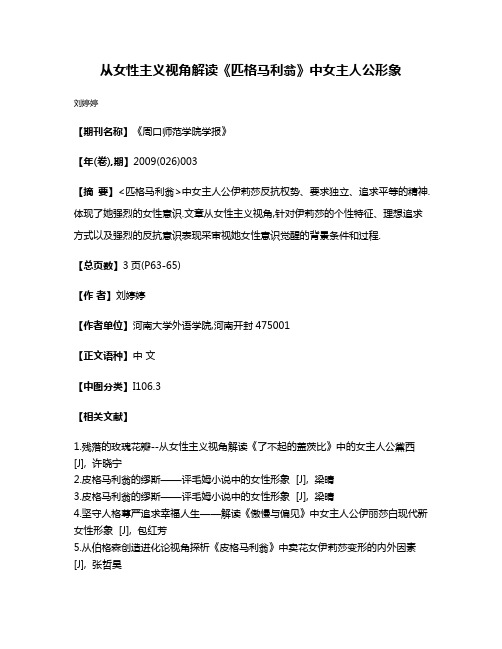
从女性主义视角解读《匹格马利翁》中女主人公形象
刘婷婷
【期刊名称】《周口师范学院学报》
【年(卷),期】2009(026)003
【摘要】<匹格马利翁>中女主人公伊莉莎反抗权势、要求独立、追求平等的精神.体现了她强烈的女性意识.文章从女性主义视角,针对伊莉莎的个性特征、理想追求方式以及强烈的反抗意识表现采审视她女性意识觉醒的背景条件和过程.
【总页数】3页(P63-65)
【作者】刘婷婷
【作者单位】河南大学外语学院,河南开封475001
【正文语种】中文
【中图分类】I106.3
【相关文献】
1.残落的玫瑰花瓣--从女性主义视角解读《了不起的盖茨比》中的女主人公黛西[J], 许晓宁
2.皮格马利翁的缪斯——评毛姆小说中的女性形象 [J], 梁晴
3.皮格马利翁的缪斯——评毛姆小说中的女性形象 [J], 梁晴
4.坚守人格尊严追求幸福人生——解读《傲慢与偏见》中女主人公伊丽莎白现代新女性形象 [J], 包红芳
5.从伯格森创造进化论视角探析《皮格马利翁》中卖花女伊莉莎变形的内外因素[J], 张哲昊
因版权原因,仅展示原文概要,查看原文内容请购买。
注定的遗憾_萧伯纳_卖花女_的女性主义解读

女人的生存的权利都不及他的语音研究那么重要。 在剧 中, 他对待伊莉莎始终态度粗暴, 一直凌驾于伊莉莎之 上。 在他眼中女性只是男性的附属品,并不需要享有经济 的独立。 “她要钱做什么?”[1](P87)美国女权主义的先锋人物 凯特·米利特认为,男性在经济上控制女性是实现男权社 会父权制统治的最有效途径。 [3]因为在经济上享有支配 权,男性便可以享有支配控制女性的权利。 在息金斯眼中 女性甚至于就是一件物品,可以买卖。 当母亲要杜立特尔 养伊莉莎时,他大怒:“胡扯,他不可能养她,她不属于她 了,我已经出五英镑买她了,这个女孩不属于任何人,除 了我。 ”[1](P240) 息金斯对女性有一种本能的偏见与蔑视: “我发现一旦我和女性交上朋友,她就会变得妒忌,挑剔 … … 女人把什 么都搞坏了 。 ”[1](P89)父权制观念的核心之一 便是贬低女性,认为女性在价值上低于男性,因此女性理 所当然的应受男性统治。 在息金斯眼中,伊莉莎就是他捡 来的一块烂白菜叶,可任由他摆布与控制。 即便后来他对 伊莉莎产生感情,可是他所爱的也是他创造的“伊莉莎夫 人”形象,他的一个作品。 在剧的第五幕息金斯虽然请求 伊莉莎回到他的身边, 但他依然不能摆脱自己大男子主 义高高在上的姿态,对伊莉莎提出的平等关爱的要求,他 不屑地斥之为“小狗的把戏”。 最后当他发现他再也不能 对伊莉莎实行经济上的控制时, 他不得不承认了伊莉莎 的地位:“你和我和辟克林将要是三个单身汉而不是两个 男人和一个傻姑娘了。 ”[1](P305)他的这一表白貌似他承认 了伊莉莎的平等地位, 可是他的二元对立思维方式仍未 改变,他视已经学会和他一样技能、经济上可以独立的伊 莉莎为男士而不承认她是一位有着自己独立自主人格的 姑娘, 说明在他的潜意识里女性是不应该和男性享有经 济和思想上平等地位的。 他所希望的那个他创造的“伊莉 莎夫人”回到他的身边,只是对已经觉醒的伊莉莎来说, 还会回到他的身边做一个活的玩偶吗?
外在与灵魂的两次飞跃--《卖花女》中伊莉莎的自我塑造

了 巨大 的变 化 。在 《 卖 花 女 》 中, 我们 可 以看 到 原 始 的 神 话 痕 迹 ,但 是 也 能找 到 作 者 的创 新 。伊 莉 莎 不 甘成 为 希 金 斯 的 玩偶 ,她 是个 渴 望 平等 希 金 斯 的相 处 中,对 她 来 说重 要 的改 变 不 是 希 金 斯 给她 带 来 外在 的飞 跃 ,而 是 自身 内在 的灵魂 上 的飞跃 。 参考 文 献 : [ 1 】 萧伯 纳 . 杨宗宪译 . 卖 花女 [ MI . 外 国 戏 剧 百 年 精 华, 苏福忠编 . 北京 : 人民文学出版社 , 2 0 0 5 . 豳黑格尔 . 美学 ( 第一卷) 嗍. 北京 : 上午印书馆 , 1 9 8 2 .
二 、外在 的飞跃
在 希 金斯 的帮 助 下 ,伊莉 莎 的 外在 有 了惊 人 的变化 。 在 刚 出 场 时 ,伊 莉 莎是 一 个 穿 着 脏衣 服 , 说 话带 口音 的 姑 娘 。她 “ 戴 着 一 顶 黑 色 的 水手 小草 帽 , 沾满 伦 敦 的尘 土 和煤 烟 ,大 概从 来 也没 有刷 过 。她 的 头 发也 该洗 洗 了 , 那 像个 灰 老 鼠似 的颜 色 绝 不会 是天 然 的 , , l “ 。在 一 番打 扮 过 后 ,伊莉 莎 变成 了 “ 一位 秀 丽 而极 其整 洁 的 日本 少女 ” …在 外 国大使 的舞会 上伊 莉莎 成 功的 吸引 了大家 的眼 球 。
四 、结语 虽然 萧 伯 纳 指 出,他 创 造 《 卖 花 女 》 的初 衷 是 提 倡 大众 学 习纯正 的语音 ,他 在剧 本 的序 言里说 :“英 国人 不 关 心他 们 的 语 言, 而且 也不 愿 意 教他 们 的 孩 子讲 英 语 我 们 今 天 需 要 的 改革 家 是 一位 精 力 充沛 的语 音 学 家 。这 就
皮格马利翁中的语言危机和身份危机
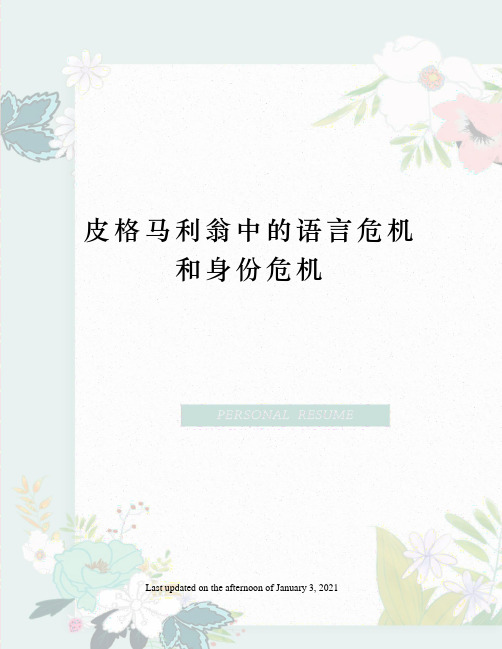
皮格马利翁中的语言危机和身份危机Last updated on the afternoon of January 3, 2021《皮格马利翁》中的语言危机和身份危机[摘要]萧伯纳的剧作《皮格马利翁》源自希腊神话故事,讲的是一个出身贫寒的卖花女伊莉莎如何被训练成为一个上流社会的语音纯正、谈吐文雅、仪态端庄的淑女。
本文以福柯的权力—话语理论为基础,分析卖花女伊莉莎在学习上流社会语言时遇到的语言危机及随之而来的身份危机。
[关键词]萧伯纳;《皮格马利翁》;语言危机;权力—话语理论一、前言萧伯纳的《皮格马利翁》可分为两部分的两幕剧,每部分都是皮格马利翁式的神话:第一部分卖花女被训练成为一个上流社会的淑女;第二部分为从淑女到独立女性的蜕变。
初读这部剧本,读者会误认为这是一部灰姑娘的故事:出租车是童话故事里的南瓜马车,把戴着鸵鸟毛帽子、穿着粗布外衣的灰姑娘带到了希金斯的实验室。
通过语言学教授希金斯对其六个月发音、讲话方式和行为举止的训练,灰姑娘伊莉莎成为语音纯正、谈吐文雅、仪态端庄的淑女。
在萧伯纳的笔下,卖花女是无知的,她并没有意识到自己的阶级差异,只是着眼于较为肤浅的外在品质,即高贵的谈吐方式和优雅的礼仪风度,并没有意识到金钱和物质是隐藏在华丽外表下的经济基础。
显然,皮格马利翁式的神话在萧伯纳的笔下,被赋予了一定的社会意义,体现出了社会的不平等:上层阶级的语言及生活方式被用作下层阶级的“正面的”参照,实际上它们实施的是符号权力。
社会学家认为权力不是存在于词语或符号本身中,而是存在于人们对词语的合法性的信仰以及对说出这个语词的人的信仰。
六个月后,卖花女掌握了上流社会的高贵语言,却把自己的cockneyaccent完全忘记了,就是想用以前的发音说话也已经做不到了。
从某一层面上说,蜕变后的卖花女伊莉莎成为语言的奴隶,然而她并不是放弃反抗的权利而一味地妥协。
相反的,她是在跟希金斯代表的父权制社会暗暗地进行着斗争,这种意识源自女性自主意识的觉醒,也是对拥有话语权力一方的积极反抗。
英语专业毕业论文--论萧伯纳《皮格马利翁》中伊莉莎的女性独立

XXXX大学本科毕业论文(设计)任务书编号:论文(设计)题目:论萧伯纳《皮格马利翁》中伊莉莎的女性独立学院:外国语学院专业:机器翻译班级: 2009级机器翻译班学生姓名: XX 学号: XXXXXX 指导教师: XXX 职称:讲师1、论文(设计)研究目标及主要任务本论文的研究目标是探讨萧伯纳《皮格马利翁》中女性独立对女性幸福的重要影响。
其主要任务是通过阐述女性独立意识对女性幸福生活的重要影响呼吁女性要独立。
2、论文(设计)的主要内容本论文分为三章,第一章介绍伊莉莎独立意识形成的原因,第二章介绍伊莉莎独立意识的具体表现,最后一章介绍独立意识给伊莉莎人生带来的影响。
3、论文(设计)的基础条件及研究路线本论文的基础条件是不同的文学家、评论家及作者本人对作品的解读。
研究路线是对萧伯纳《皮格马利翁》中女主人公伊莉莎的女性独立意识为其生活带来的影响进行详细分析。
4、主要参考文献George Bernard Shaw, Pygmalion and Major Barbara, 贵州科技出版社,1992.The Cambridge Companion to Feminism in Philosophy, Cambridge University Press.萧伯纳.卖花女[M].杨宪益,译.北京:中国对外翻译出版公司,2001。
塔特洛克,希腊罗马神话,中央编译出版社,2012。
陈敏,皮格马利翁效应:用赞美、信任和期待来改变个人和团队的成功法则,北京工业大学出版社,2005。
沃特斯(朱刚、马晓蓉译),女权主义简史,外语教学与研究出版社,2008。
5、计划进度阶段起止日期1 确定初步论文题目3月16日前2 与导师见面,确定大致范围,填开题报告和任务书,导师签字3月16日-3月23日3 提交论文提纲3月23日-3月30日4 交初稿和文献综述4月20日5 交终稿和评议书5月8日前指导教师:年月日教研室主任:年月日注:一式三份,学院(系)、指导教师、学生各一份XXXX大学本科生毕业论文(设计)开题报告书外国语学院机器翻译专业 XXX 届学生姓名XX论文(设计)题目论萧伯纳《皮格马利翁》中伊莉莎的女性独立指导教师XXX专业职称讲师所属教研室商务英语教研室研究方向英语语言文学课题论证:通过研究萧伯纳《皮格马利翁》中女主人公伊莉莎的独立意识对其生活的影响来探讨女性独立意识对女性幸福的重要影响。
萧伯纳戏剧《皮格马利翁》中的神话框架分析

An Analysis of the Mythological Structure of
Bernard Shaw’s Pygmalion
作者: 张珊[1]
作者机构: [1]复旦大学中文系
出版物刊名: 理论界
页码: 102-108页
年卷期: 2019年 第10期
主题词:�皮格马利翁》;皮格马利翁神话;萧伯纳;原型批评
摘要:萧伯纳的戏剧《皮格马利翁》中纳入了古希腊皮格马利翁雕刻象牙女郎的神话,剧作中的皮格马利翁息金斯是一位全心全意投身于研究和教学的语音学教授,他对于卖花女伊莉莎的改造体现了萧伯纳对英语使用规范化的期望,并通过伊莉莎的成功变形向我们示范了语言更新所能给个体带来的难以估量的变化。
息金斯对伊莉莎的塑造和培养,折射出男性亲手塑造理想异性的隐秘愿望和女性的第二性处境。
变形成功的象牙女郎伊莉莎最终与她的皮格马利翁息金斯分道扬镳,伊莉莎的这一决定既受到息金斯的造物主心态和她自身独立平等意识的影响,同时也出于她与弗莱迪共处于阶层夹缝的相似身份困境的考量。
通过《皮革马利翁》看萧伯纳的女性观
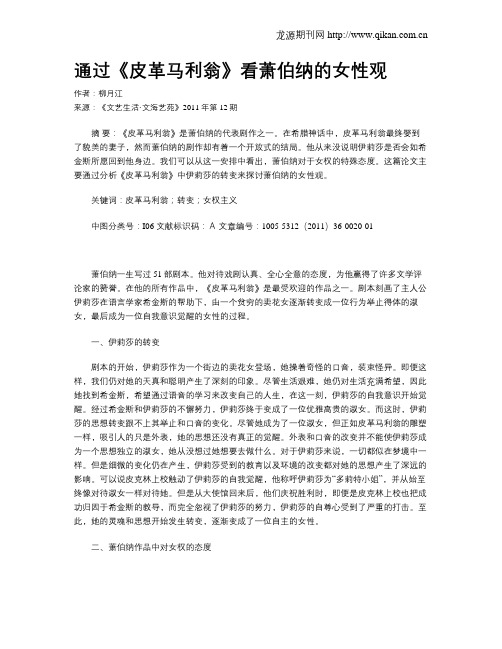
通过《皮革马利翁》看萧伯纳的女性观作者:柳月江来源:《文艺生活·文海艺苑》2011年第12期摘要:《皮革马利翁》是萧伯纳的代表剧作之一。
在希腊神话中,皮革马利翁最终娶到了貌美的妻子,然而萧伯纳的剧作却有着一个开放式的结局。
他从来没说明伊莉莎是否会如希金斯所愿回到他身边。
我们可以从这一安排中看出,萧伯纳对于女权的特殊态度。
这篇论文主要通过分析《皮革马利翁》中伊莉莎的转变来探讨萧伯纳的女性观。
关键词:皮革马利翁;转变;女权主义中图分类号:I06 文献标识码:A文章编号:1005-5312(2011)36-0020-01萧伯纳一生写过51部剧本。
他对待戏剧认真、全心全意的态度,为他赢得了许多文学评论家的赞誉。
在他的所有作品中,《皮革马利翁》是最受欢迎的作品之一。
剧本刻画了主人公伊莉莎在语言学家希金斯的帮助下,由一个贫穷的卖花女逐渐转变成一位行为举止得体的淑女,最后成为一位自我意识觉醒的女性的过程。
一、伊莉莎的转变剧本的开始,伊莉莎作为一个街边的卖花女登场,她操着奇怪的口音,装束怪异。
即便这样,我们仍对她的天真和聪明产生了深刻的印象。
尽管生活艰难,她仍对生活充满希望,因此她找到希金斯,希望通过语音的学习来改变自己的人生,在这一刻,伊莉莎的自我意识开始觉醒。
经过希金斯和伊莉莎的不懈努力,伊莉莎终于变成了一位优雅高贵的淑女。
而这时,伊莉莎的思想转变跟不上其举止和口音的变化。
尽管她成为了一位淑女,但正如皮革马利翁的雕塑一样,吸引人的只是外表,她的思想还没有真正的觉醒。
外表和口音的改变并不能使伊莉莎成为一个思想独立的淑女,她从没想过她想要去做什么。
对于伊莉莎来说,一切都似在梦境中一样。
但是细微的变化仍在产生,伊莉莎受到的教育以及环境的改变都对她的思想产生了深远的影响。
可以说皮克林上校触动了伊莉莎的自我觉醒,他称呼伊莉莎为“多莉特小姐”,并从始至终像对待淑女一样对待她。
但是从大使馆回来后,他们庆祝胜利时,即便是皮克林上校也把成功归因于希金斯的教导,而完全忽视了伊莉莎的努力,伊莉莎的自尊心受到了严重的打击。
从《皮格马利翁》看萧伯纳女权主义思想的局限性
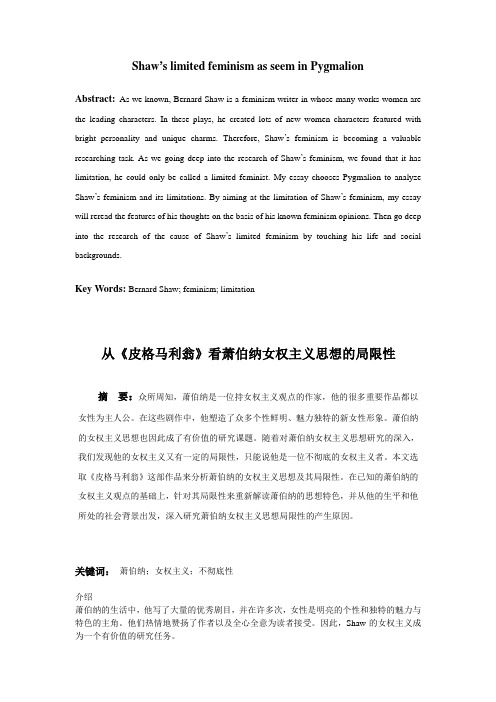
Shaw’s limited feminism as seem in PygmalionAbstract:As we known, Bernard Shaw is a feminism writer in whose many works women are the leading characters. In these plays, he created lots of new women characters featured with bright personality and unique charms. Therefore, Shaw’s feminism is becoming a valuable researching task. As we going deep into the research of Shaw’s feminism, we found that it has limitation, he could only be called a limited feminist. My essay chooses Pygmalion to analyze Shaw’s feminism and its limitations. By aiming at the limitation of Shaw’s feminism, my essay will reread the features of his thoughts on the basis of his known feminism opinions. Then go deep into the research of the cause of Shaw’s limited feminism by touching his life and social backgrounds.Key Words: Bernard Shaw; feminism; limitation从《皮格马利翁》看萧伯纳女权主义思想的局限性摘要:众所周知,萧伯纳是一位持女权主义观点的作家,他的很多重要作品都以女性为主人公。
“英式淑女”创造记:浅析《皮革马利翁》中的女性意识
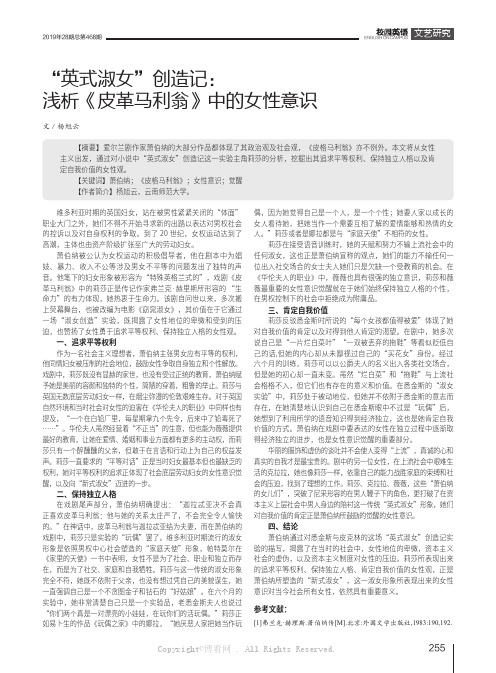
2552019年28期总第468期ENGLISH ON CAMPUS “英式淑女”创造记:浅析《皮革马利翁》中的女性意识文/杨旭云偶,因为她觉得自己是一个人,是一个个性;她要人家以成长的女人看待她,把她当作一个需要互相了解的爱情能够和热情的女人。
”莉莎或者是娜拉都是与“家庭天使”不相符的女性。
莉莎在接受语音训练时,她的天赋和努力不输上流社会中的任何淑女,这也正是萧伯纳宣称的观点,她们的能力不输任何一位出入社交场合的女士夫人她们只是欠缺一个受教育的机会。
在《华伦夫人的职业》中,薇薇也具有很强的独立意识,莉莎和薇薇最重要的女性意识觉醒就在于她们始终保持独立人格的个性,在男权控制下的社会中拒绝成为附庸品。
三、肯定自我价值莉莎反驳悉金斯时所说的“每个女孩都值得被爱”体现了她对自我价值的肯定以及对得到他人肯定的渴望。
在剧中,她多次说自己是“一片烂白菜叶”“一双被丢弃的拖鞋”等看似贬低自己的话,但她的内心却从未鄙视过自己的“买花女”身份。
经过六个月的训练,莉莎可以以公爵夫人的名义出入各类社交场合,但是她的初心却一直未变。
虽然“烂白菜”和“拖鞋”与上流社会格格不入,但它们也有存在的意义和价值。
在悉金斯的“淑女实验”中,莉莎处于被动地位,但她并不依附于悉金斯的意志而存在,在她清楚地认识到自己在悉金斯眼中不过是“玩偶”后,她想到了利用所学的语音知识得到经济独立,这也是她肯定自我价值的方式。
萧伯纳在戏剧中要表达的女性在独立过程中逐渐取得经济独立的进步,也是女性意识觉醒的重要部分。
华丽的服饰和虚伪的谈吐并不会使人变得“上流”,真诚的心和真实的自我才是最宝贵的。
剧中的另一位女性,在上流社会中艰难生活的克拉拉,她也像莉莎一样,依靠自己的能力战胜家庭的束缚和社会的压迫,找到了理想的工作。
莉莎、克拉拉、薇薇,这些“萧伯纳的女儿们”,突破了尼采形容的在男人鞭子下的角色,更打破了在资本主义上层社会中男人身边的陪衬这一传统“英式淑女”形象,她们对自我价值的肯定正是萧伯纳所鼓励的觉醒的女性意识。
《卖花女》主人公伊莉莎的人物塑造
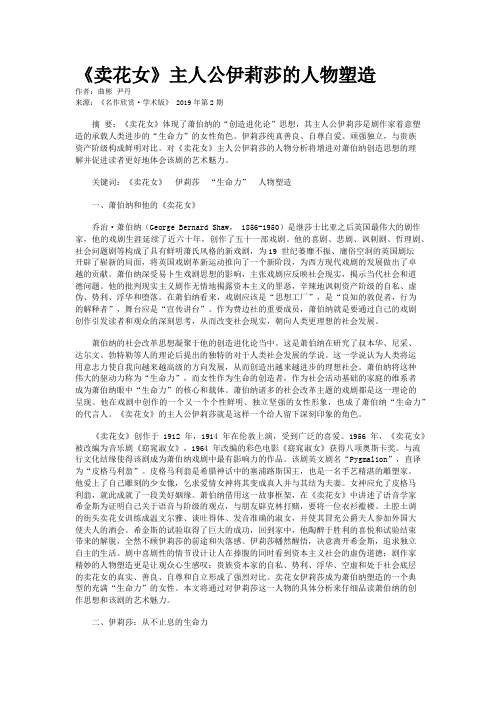
《卖花女》主人公伊莉莎的人物塑造作者:曲彬尹丹来源:《名作欣赏·学术版》 2019年第2期摘要:《卖花女》体现了萧伯纳的“创造进化论”思想,其主人公伊莉莎是剧作家着意塑造的承载人类进步的“生命力”的女性角色。
伊莉莎纯真善良、自尊自爱、顽强独立,与贵族资产阶级构成鲜明对比。
对《卖花女》主人公伊莉莎的人物分析将增进对萧伯纳创造思想的理解并促进读者更好地体会该剧的艺术魅力。
关键词:《卖花女》伊莉莎“生命力”人物塑造一、萧伯纳和他的《卖花女》乔治·萧伯纳(George Bernard Shaw, 1856-1950)是继莎士比亚之后英国最伟大的剧作家,他的戏剧生涯延续了近六十年,创作了五十一部戏剧。
他的喜剧、悲剧、讽刺剧、哲理剧、社会问题剧等构成了具有鲜明萧氏风格的新戏剧,为19 世纪萎靡不振、庸俗空洞的英国剧坛开辟了崭新的局面,将英国戏剧革新运动推向了一个新阶段,为西方现代戏剧的发展做出了卓越的贡献。
萧伯纳深受易卜生戏剧思想的影响,主张戏剧应反映社会现实,揭示当代社会和道德问题。
他的批判现实主义剧作无情地揭露资本主义的罪恶,辛辣地讽刺资产阶级的自私、虚伪、势利、浮华和堕落。
在萧伯纳看来,戏剧应该是“思想工厂”,是“良知的敦促者,行为的解释者”,舞台应是“宣传讲台”。
作为费边社的重要成员,萧伯纳就是要通过自己的戏剧创作引发读者和观众的深刻思考,从而改变社会现实,朝向人类更理想的社会发展。
萧伯纳的社会改革思想凝聚于他的创造进化论当中。
这是萧伯纳在研究了叔本华、尼采、达尔文、勃特勒等人的理论后提出的独特的对于人类社会发展的学说。
这一学说认为人类将运用意志力使自我向越来越高级的方向发展,从而创造出越来越进步的理想社会。
萧伯纳将这种伟大的驱动力称为“生命力”,而女性作为生命的创造者,作为社会活动基础的家庭的维系者成为萧伯纳眼中“生命力”的核心和载体。
萧伯纳诸多的社会改革主题的戏剧都是这一理论的呈现。
浅析《皮格马利翁》中伊莉莎伦理身份的“惑”与“解”的论文
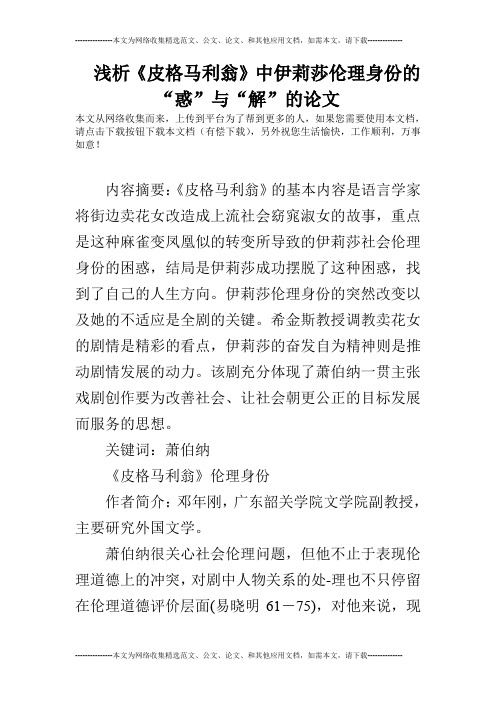
浅析《皮格马利翁》中伊莉莎伦理身份的“惑”与“解”的论文本文从网络收集而来,上传到平台为了帮到更多的人,如果您需要使用本文档,请点击下载按钮下载本文档(有偿下载),另外祝您生活愉快,工作顺利,万事如意!内容摘要:《皮格马利翁》的基本内容是语言学家将街边卖花女改造成上流社会窈窕淑女的故事,重点是这种麻雀变凤凰似的转变所导致的伊莉莎社会伦理身份的困惑,结局是伊莉莎成功摆脱了这种困惑,找到了自己的人生方向。
伊莉莎伦理身份的突然改变以及她的不适应是全剧的关键。
希金斯教授调教卖花女的剧情是精彩的看点,伊莉莎的奋发自为精神则是推动剧情发展的动力。
该剧充分体现了萧伯纳一贯主张戏剧创作要为改善社会、让社会朝更公正的目标发展而服务的思想。
关键词:萧伯纳《皮格马利翁》伦理身份作者简介:邓年刚,广东韶关学院文学院副教授,主要研究外国文学。
萧伯纳很关心社会伦理问题,但他不止于表现伦理道德上的冲突,对剧中人物关系的处-理也不只停留在伦理道德评价层面(易晓明61-75),对他来说,现代社会的当务之急不再是所谓“明辨是非”(王小波1-7)的问题,而是要解决贫穷的问题:“贫穷是我们社会中最可怕的罪行。
而我们超越一切的首要责任,就是做到不穷。
”阅读《资本论》的经历也增强了萧伯纳的经济学视野,他真切希望通过知识改变个人和社会,提升个人能力,促进社会进步。
跟易卜生、布莱希特一样,萧伯纳非常敏锐地感受到经济因素对社会生活的巨大影响,“在易卜生、萧伯纳或布莱希特等作家的剧本里,对于近百年来的许多社会问题,不仅是大声疾呼,而且提出答案”(艾思林13)。
他的戏剧《皮格马利翁》于1912年问世后,获得空前成功,多次搬上银幕,1956年改编成音乐剧《窈窕淑女》在百老汇连演2717场,1964年改编的彩色电影《窈窕淑女》获得8项奥斯卡奖。
因为它既体现了作家对社会伦理问题的关心,又突出了知识改变人的命运的思想,所以也持久地吸引着人们的注意力,“在戏剧里,寻求其真意所在,并对剧情和我们目睹的重大事件做出我们自己的解释,责任还在于我们观众”(艾思林107)。
从伯格森创造进化论视角探析《皮格马利翁》中卖花女伊莉莎变形的内外因素
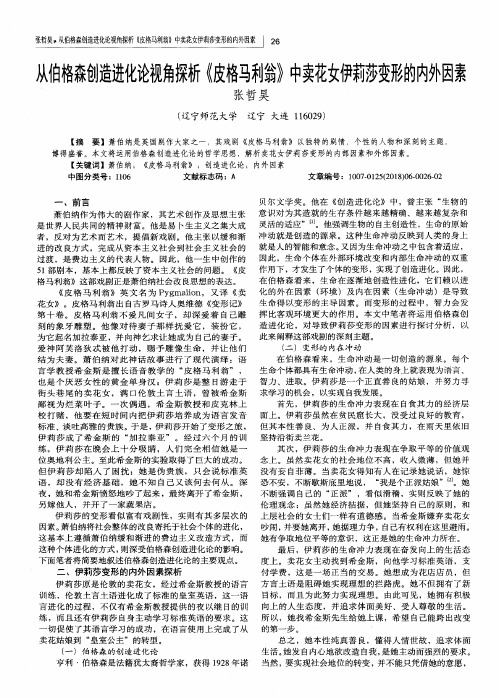
但 伊 莉 莎 却 陷入 了 困 扰 :她 是 伪 贵 族 ,只 会 说 标 准 英 没有 妄 自菲薄 。当卖 花 女得 知 有 人在 记 录她 说 话 ,她惊
语 , 却 没 有 经 济 基 础 ,她 不 知 自 己又 该 何 去 何 从 。 深 恐不安 ,不断歇 斯底 里地说 , “我是 个正 派姑 娘 ”‘ 。她
花 女 。皮格 马 利翁 出 自古 罗 马 诗人 奥 维德 变 形 记 生命 得 以变 形 的 主导 因素 。而变 形 的 过程 中 ,智 力 会发
第 十卷 。 皮格 马 利 翁 不 爱 凡 间 女 子 ,却 深 爱 着 自 己雕 挥 比客 观环 境 更大 的作用 。本 文 中笔者 将 运用 伯 格森 创
者 ,反对 为 艺 术 而艺 术 ,提 倡新 戏 剧 。他 主 张 以缓 和渐 冲 动就 是创 造 的源泉 。这种 生 命冲 动 反 映到 人类 的身 上
进 的改 良方 式 ,完成 从 资本 主 义社 会 到社 会 主义 社 会 的 就 是人 的智 能和意念 。又 因为生命 冲动 之 中包 含着 适应 ,
张哲吴,从伯格森创造进化论视角探析《皮格马利翁*中卖花女伊莉莎变形的内外因素 l 26
从伯格森创造进化论视角探析《皮格马利翁》中卖花女伊莉莎变形的内外因素
张 哲 昊
(辽宁师范大学 /-L宁 大连 116029)
【摘 要 】萧伯 纳是英 国剧作大 家之 一 ,其戏剧 ((皮格马利翁 以独特的剧情 ,个性 的人物和深 刻的主题
贝 尔文 学 奖 。他在 创 造进 化 论 中 ,曾主 张 “生 物 的
萧伯 纳 作 为伟 大 的剧 作 家 ,其 艺术 创 作及 思 想 主 张 意识 对 为其 造 就 的生 存 条件 越 来越 精 确 、越 来越 复 杂 和
《皮格马利翁》中卖花女阶级跨越失败的必然性

文学评论·外国文学《皮格马利翁》中卖花女阶级跨越失败的必然性刘雅琳 湖南师范大学摘 要:萧伯纳的《皮格马利翁》呈现了一位生活在社会底层的卖花女尝试通过语音训练,学习上层阶级的说话方式从而实现阶级跨越的故事。
其结果表面上看起来是成功的,这部戏剧也长久以来是读者和观众所公认的喜剧。
而实际上,卖花女伊莉莎身份转变的实验是失败的,因为伊莉莎唯一改变的只有口音和行为,她始终缺乏上层阶级的精英教育,文化习惯的熏陶,以及最重要的资本条件。
此外,所谓的“变身”只不过是上层阶级的一个赌注,并非伊莉莎的“主动跨越”。
萧伯纳自身以及剧中语言学家的阶级局限性和费边主义的不现实性,则是卖花女阶级跨越失败的根源。
关键词:《皮格马利翁》;阶级跨越;资产阶级;工人阶级;费边主义[中图分类号]:I106 [文献标识码]:A[文章编号]:1002-2139(2019)-17-108-02《皮格马利翁》是一部由爱尔兰剧作家乔治•伯纳德•萧(1856-1950)所创作的一部戏剧。
它描绘了一位工人阶级女孩尝试通过学习资产阶级口音从而改变自己社会身份,但以失败告终的故事。
卖花女伊莉莎的确具备语言学习的天赋,剧终她也学会了当时上层阶级的口音,然而,这种变化并未使她真正成为一位“淑女”,因为她缺乏成为资产阶级的资本和高等文化教育给她的塑造。
另外,希金斯和皮克林两位语言学家努力训练伊莉莎的目的不过是推广上层阶级的“标准英语”以及满足打赌的乐趣。
最后,作为一名费边主义者的萧伯纳在结尾也已伊莉莎身份的迷失和归属感的迷茫,也间接承认了单靠资产阶级的文化改良的不现实性。
第一章 无产阶级的无力的挣扎根据第十一版韦伯斯特大学词典的定义,“无产阶级”是指劳动阶级,特别是那些缺乏自己的生产资料并因此将劳动力卖给生活的工业工人阶级,或社会中最低的社会或经济阶层。
在《皮格马利翁》中,卖花女伊丽莎属于无产阶级。
伊丽莎以卖花谋生且没有其他收入来源。
即使她改变了自己的外表,她仍然是一个没有资本的无产阶级。
从萧伯纳《卖花女》中的伊莉莎分析女性主义

On Aesthetic V alue of Thomas Hardy’s Poems中美商务谈判的风格差异论国际商务中的跨文化有效沟通《智血》中主要人物生命历程解读浅析《飘》中女性主义的萌发名词化隐喻在外贸函电中的功能分析汉英“甜”字隐喻用法对比少儿英语语言学习策略调查与研究英汉动物词语隐喻意义的对比分析文化语境与语言交际能力的培养新兴资产阶级代表—鲁滨逊克鲁索情态人际意义的跨文化研究《红字》中海斯特性格分析中国特色词汇及其翻译从《法国中尉的女人》看约翰福尔斯的女性主义思想及其局限性简•爱和林黛玉不同命运的跨文化解读The Symbolic Meaning of Setting and Characters in Howards End中西方语言和文化间的相互影响A Comparison of the English Color Terms小学英语教学中的情感因素初探中美称赞语的对比分析从接受美学视角看旅游广告的翻译文字之乐——浅析广告中的双关英语委婉语中的转喻现象分析庞德《诗经》英译研究分析《喧哗与骚动》中昆丁的人物形象和悲剧意义A Diachronic Study on Sexism in English Lexicon生态哲人约翰•斯坦贝克Analysis on Moon Image in Lawrence’s Novels------Industrialism and Chauvinism 国际商务英语合同翻译策略研究A Comparative Study of Chinese and English Polite LanguagesA Chinese-English Translation of Public Signs Based on Nida's Fuctional Equivalence Theory 中美不同家庭教育观念对孩子语表达的影响--从个人主义与集体主义的角度分析从合作性原则看品牌代言中广告语的使用英语语言中的性别歧视《贵妇画像》主题和写作艺术特征Imagery Translation in Classical Chinese Poetry高中英语写作作业的反馈及实施效果On Nabokov’s ―Lolita‖ and Its Adaptation into the Movie by Stanley Kubr ick化妆品广告的语用预设分析探究斯蒂芬•克莱恩诗集中的三类意象——以《黑骑者》为例《红字》中替罪羊形象的分析论《永别了,武器》中战争对人物的影响On the Importance of China English as an English V ariant旅游翻译中的跨文化语用失误浅析多丽丝•莱辛《金色笔记》中安娜的个性化历程和小说形式的关系弗吉尼亚•伍尔夫《海浪》的叙事技巧分析影响大学生英语自主学习的因素研究《永别了武器》中战争对人类所造成的毁灭中英文化差异与翻译策略顺应论视角下的电影片名翻译(开题报告+论)福克纳短篇小说《献给爱米莉的玫瑰》叙事技巧分析简单原则:《瓦尔登湖》的主题分析Influence of Western Food Culture upon Chinese PeopleAn Analysis of Jennie’s Tragedy in Jennie Gerhardt威廉·斯泰伦《苏菲的选择》中的人文主义An Analysis of Oscar Wilde’s Subversion of Traditional Fairy Tales言语行为理论在戏剧《芭芭拉少校》对白分析中的应用论小学英语教学中学习动机促进法An Analysis of V erbal Humor in American Sitcom Friends from the Perspective of Cooperative Principal试论盖茨比对其梦想生活的追求英式英语与美式英语的拼写差异中美家庭价值观差异浅析《绯闻少女》中的话语标记词研究《心是孤独的猎手》中的主题分析从新历史主义视角解读杰罗姆•大卫•塞林格《麦田里的守望者》王尔德童话中的毁灭与拯救从文化内涵的角度看汉语动物习语的英译《还乡》中游苔莎的悲剧命运分析从语境视角看英译汉字幕翻译——以《梅林传奇》为例《哈利波特》的原型——亚瑟王传奇A Comparison of the English Color Terms工业化进程下人的主体性的追问——梭罗的《瓦尔登湖》功能对等理论透视下的影视片名翻译Analysis of the New Female Scarlett in Gone with the Wind法律英语词汇特点及其翻译论“成长的烦恼”中的美国家庭文化论英美文学作品中的人名寓意及翻译从女性主义分析《红字》与《傲慢与偏见》林黛玉和简.爱不同命运的对比电影《肖申克的救赎》中的沉默之语用分析论《红字》中的清教主义思想浅析莎士比亚四大悲剧作品中人文精神的一致性英汉视觉动词概念隐喻的对比研究《蝇王》中的象征论《永别了,武器》的写作风格浅析《儿子与情人》中的恋母情结浅析初中英语语音教学中存在的问题及对策英汉颜色词“红”的喻意和文化内涵研究从女性主义视角分析《飘》中斯佳丽人物形象中西方商务礼仪的差异《嘉莉妹妹》中的自然主义从禁忌语的差异看中英文化的差异论《麦田里的守望者》的意义房地产广告的英译研究《追风筝的人》作为成长小说的的体裁分析A Research on V ocabulary Learning Strategies Employed by Non-English Majors in the CALL Environment《三国演义》不同译本中回目英译比较研究析《虹》中的象征意义Unreliable Narration – The Approach to Irony in Pride and Prejudice论英语被动语态的语篇功能及其翻译策略—以《高级英语》第二册为例如何通过教师提问促进课堂互动浅析《儿子与情人》的人物刻画的技巧试析中文歌曲汉英语码转换的形式与功能形合与意合对比研究及翻译策略A Comparison of the English Color Terms是受害者还是恶棍——重新解读夏洛克《布罗迪小姐的青春》中的人物冲突分析从《红楼梦》和《简爱》看中西方女性主义浅析理发师陶德一剧中歌词的妙用Coincidences and Images in The Mayor of Casterbridge, Tess of the D’Urbervilles重新诠释玛格丽特的人生悲剧根源Discourse Analysis on the Translation of Person of the Y ear, an Editorial in the Time MagazineOn the Racial Discrimination in America in Beloved从跨文化交际角度看电影片名翻译《飘》中生态女性意识的研究中美时间观差异对跨文化交际的影响论莎士比亚《仲夏夜之梦》中的人文主义思想解读《拉帕希尼的女儿》中的父爱A Study of the Protagonist’s Pursuit of Identity in Invisible Man从浪漫主义角度剖析《海上钢琴师》在中国流行的原因从《红楼梦》两个译本论归化翻译和异化翻译论奥斯卡•王尔德的矛盾性——从传记角度解读《奥斯卡•王尔德童话集》《老人与海》中马洛林形象的不可或缺性简单的深邃—论佛洛斯特诗歌的隐秘性礼貌原则视角下奥巴马演讲技巧的分析A Contrastive Study of English and Chinese Cohesiveness浅谈商务谈判语言的特点Comparison and Translation Between Chinese and English Euphemisms外语学习中学习动机的影响高中英语课堂师生互动研究当代中美青年恭维言语行为对比研究爱与正义:《杀死一只知更鸟》主人公阿提克斯•芬奇形象解读英语教学中非言语交流与跨文化交际中能力的培养论《黑夜中的旅人》中主人公的信仰冲突与融合从《简•爱》的多译本看中国两性关系的变化浅析《老人与海》的主人公——圣地亚哥的人物形象分析英语电影片名的翻译策略与方法从福斯特《天使不敢涉足的地方》看英国转型期中产阶级价值观论新闻英语中的选词及其翻译高中英语阅读教学中学生自主学习能力的培养英汉红色词的语义对比研究《夜莺颂》的翻译技巧探究Y ou-attitude 在商务信函中的运用英汉新词形成因素研究从《盲人》中的“血性意识”看劳伦斯的文明观从礼貌原则角度分析电影《暮光之城》中的对白《麦田里的守望者》中霍尔顿成长悲剧的成因分析以及对当今青少年的启迪The Use of Body Language in Teaching英汉诗歌中“月”意象的认知解读乔纳森•斯威夫特《格列佛游记》中的讽刺艺术“省力原则”在口译过程中的应用从文化视角考察中英语言的称谓语差异中国文化特色词汇的音译与中国文化的传播简•奥斯丁的婚姻观在《傲慢与偏见》中的体现On Symbolism in Fitzgerald’s “Winter Dreams”(开题报告+论文+文献综述)文本分类理论与广告翻译浅谈《认真的重要性》里现实主义和唯美主义的冲突A Popular Form of Subtitles Translation by Fansub Group on the Internet英汉基本姿势动词(立、坐、躺)的语义实证比较研究从生态女性主义角度解读《宠儿》浅析《了不起的盖茨比》中象征主义的写作手法An Analysis of Sexism in English Proverbs民族文化差异与广告语言创意从考琳•麦卡罗《荆棘鸟》看人性同神性的挣扎商务英语合同的词汇特征A Cross-Cultural Study on Linguistic Taboo从文化的角度理解《喜福会》中的母女关系英汉成语特点对比研究张爱玲与简奥斯汀的讽刺艺术比较广告中的熟语模因探析从生态批评的视角看《远离尘嚣》的生态悖论运用“第三空间”解析《女勇士》中的文化现象游戏在小学低年级英语教学中的应用从文化角度浅议电影名翻译技巧从《喜福会》看美国华裔女作家身份探求(日语系毕业论文)关于中日赞赏语的比较研究法律英语中的情态动词shall的翻译A Comparison of the English Color Terms透过霍尔顿看《麦田里的守望者》中的代际关系Domestication and Foreignization in Idioms Translation谭恩美《喜福会》中的母女关系研究空间介词在英汉时间表达中的隐喻性用法对比研究中英婚礼习俗中的红和白颜色文化的研究《论语》中“仁”的翻译研究(开题报告+论)探寻《呼啸山庄》的道德意义现代社会的荒诞性——从黑色幽默解读《毛猿》中西方空间观对比研究浅析《道林·格雷的画像》中的享乐主义英文导游词的特点分析论小说《德库拉》中的哥特元素《麦田守望者》中霍尔顿的性格分析Pragmatic Differences of Politeness in Intercultural Communication Between English and Chinese 西方文化视域中《简爱》刍议目的论视角下《了不起的盖茨比》两个译本对比研究汉英翻译中文化传递的可接受度《永别了,武器》一书所体现的海明威的写作风格对英汉基本颜色词翻译的跨文化研究从文化差异视角看英语新闻标题的翻译The Pursuit and Disillusionment of the American Dream—On Martin Eden。
对《皮革马利翁》中伊莉莎的形象分析

Analysis of the transformation of Elisa in Pygmalionand its causesIntroductionBorn in Dublin in 1856 to a middle-class family, George Bernard Shaw gradually became one of the most important playwrights after Shakespeare. Maybe somebody disagree with such assessment, however, the fact that"a day never passes without a performance of some Shaw play being given somewhere in the world"(Schwart, 1966:24) definitely prove Shaw's charm among the readers. Of which, Pygmalion is undoubtedly the most welcomed and beloved one. Pygmalion is originally a mythology from Ovidius’s Metamorphoseon libri. Pygmalion,King of Cyprus,was a famous sculptor.He fell in love with the sculpture which was made by him. Shaw named the play after the king's name of the myth play; obviously, it shows the relationship between his work and the mythology. In the mythology, the ivory became a beautiful statue and finally a fair lady. In Shaw's play, Elisa is a cockney speaking Covent Garden flower girl at first, but became an attractive princess at last. This is the result of Higgins's six months phonetics and manner training, and after six months, Eliza is not a self-contemptuous flower girl any more, she is a brave resistant who dares to pursue her own happiness. Shaw's relapse of mythological archetype has his own purposes. Besides, he made bold changes when he imitates.Many scholars have studied this work from the perspective of feminism, Fabianism, language and translation of Shaw's Pygmalion. But the following essay will discuss the social and natural background, changes of Elisa and different causes of her transformation from a different point of view. The play demonstrates the process of the self-realization and spiritual development of the flower girl, thus contributes profound realistic significance to the classical tradition. This essay will also discuss the influence on Eliza's fate and the society of Shaw's time.1.Analysis of the transformation of ElisaEliza is the most important topic in the work of Pygmalion, she is placed in the center of the theme. Since the appearance of this great play, critics has been analyzed the phenomena of Eliza's transformation with great interest, in the following part, we will do the same thing in a deeper level.1.1 Former image of ElisaIn Act I, Elisa appears with "a little sailor hat of black straw that has long been exposed to the dust and etc. Her hair needs washing rather badly: its mousy color can hardly be natural."(Shaw, 1925: 8) Elisa is kicked out by her parent when she was a little child, and the most important thing for her is living. She has no time and no condition to dress up herself. She wants to learn how to talk more genteel from Higgins, and try to make herself clean "she has a hat with three ostrich feathers, orange, sky-blue, and red. She has a nearly clean apron, and the shoddy coat has been tidied a little."(Shaw, 1925: 51) Obviously, this is the best dress to meet the guest, but it is still "so horribly dirty" in Higgins's eye. The first impression on Higgins is terrible "a woman who utters such depressing and disgusting sounds has no right to be anywhere—no right to live."(Shaw, 1925: 70)1.2 New image of ElisaIn the mythology of Pygmalion, it's the exquisite carving skills that made the ivory become a beauty. This is the first transformation, and similar to the changes of Elisa's appearance in Shaw's Pygmalion. After Higgins's six months training, the flower girl becomes a princess. The clothes can easily be changed, the pronunciation and tone can be fixed, but inner temperament and education need a long term nurture and accumulation. Though they teach her how to choose clothes, play piano, learn many kinds of dialects, and go to concerts, all of this make her princess when she is chatwith people in the party.1.2.1 TransformationUnder Higgins's training, Elisa's clothing, conversation and comportment has changed a lot. After Mrs. Pearce helps her to have a bath and change her clothes, she becomes a "dainty and exquisitely clean young Japanese lady". Even her father doesnt recognize her and "gets out of her way deferentially and apologizes"(Shaw, 1925: 123).In order to examine her learning, Higgins brings her to his mother's at-home day. Elisa, "who is exquisitely dressed, produces an impression of such remarkable distinction and beauty" (Shaw, 1925: 161), is not only not recognized by Mrs. and Miss Eynsford Hill, but also win Freddy's adore. Later, in the ambassador's garden party, Higgins wins the bet. Elisa attracts everyone's attention in her splendid dresses.1.2.2 DisillusionmentIn the myth of Pygmalion, the second transformation from the statue to a live lady is a great change, comparing with the first one. It is animate and inanimate. We don't know whether Galatea has her own mind after she owns life, and whether she has courage and freedom to gain will. But we know that Shaw gives us a clear description. When Elisa is confused, she chooses to be strong enough to gain courage and determination to realize her dream.From the talk between Elisa and Pickering in the garden party, we can see her feeling about her change. She feels like a dream and doesn't want to be wakened. She knows it's just a dream, but she would rather indulge in it. She is totally fed up with the life of a flower girl. She was turned out by her parents for they thought that she was big enough to earn her own living when she was very young. From then on, she lived in the house worse than pigsty, sold flowers everyday. In Act I, there are many words like "springing up terrified", "hysterically"etc. She wants to get rid of herterrible life, so she comes to Higgins. She doesn't want to be a duchess but a lady in a flower shop and has a stable income and gain others' respect. From the very beginning, Elisa has decided to live by herself and will try her best once an opportunity comes. She is an independent girl with pure dreams and has affectionate feelings. She doesn't want to wake up and expect it the beautiful dream could last forever so that she would not worry about her back to a flower girl.However, the reality is cruel, which breaks her dream relentless. If the ambassador's garden party is an exciting triumph for Higgins and Pickering, it is totally a torturing for Elisa. She copes with the task with all her heart and soul, like walking in the desert. After the dream comes to its end, Eliza has to think about her future. She realizes the distance between the current life and her ideal life finally. The difference between upper class and lower class is nothing but the so-called education and elegant language. She needs something more real and more essential to prove the existence of herself. When she heard Higgins says fervently "Thank god, its over!"(Shaw, 1925: 211), she flinches violently. For those two gentlemen, it's just a game; but Elisa put all her best hope of future life in it. She doesn't know what to do next and can't see any way out of that. The game is over, and its time to wake up. "Elisa tries to control herself and feel indifferent……Finally she gives way and flings herself furiously on the floor, raging."(Shaw, 1925: 215) The peace she tries to keep is breakdown, she "snatching up the slippers, and hurling them at him one after the other with all her force". This is a turning point of her inner growth. Two gentlemen's indifference is a dose of fierce medicine that she has to wake up and all the worries emerged. She gives a suffocated scream of fury, and questions Higgins "What to become of me? What to become of me?" "How the devil do I know what to become of you? What does it matter what becomes of you?"(Shaw, 1925: 217) Higgins answers. And this makes Elisa fully wake up. Higgins takes his control of Elisa as a matter of course. At the same time, Elisa chooses to leave wisely and bravely there even though she doesn't know what to do next just like the moment she comes. She doesn't want to be a wretch fooled by fate. She has regarded Higgins and Pickering as her friends, but finally realizes that they're not in the same world. So she breaks with them and leaveswithout hesitation. It's really a hard time and a difficult decision for her, but she made it. She completes her transformation and shows her persistence in the establishment of her identity. In the last act, the discourse initiative has reversed. Elisa is "sunny, self-possessed and giving a staggeringly convincing exhibition of ease of manner" and Higgins is outburst". From her attitude towards Higgins, we can see that she knows what she wants to do and hopes for, she is not afraid of life any more. She says "what I did was not for the dresses and the taxis: I did it because we were pleasant together and I come–came–to care for you; not to want you to make love to me, and not forgetting the difference between us, but more friendly like."(Shaw, 1925: 305) , She points out her desire for kindness, but because of their difference of values this communication break up unhappily. Elisa insists on her independence and never gives up. At last, Higgins admits her mature in his way; he says "You and I and Pickering will be three old bachelors together instead of only two men and a silly girl."(Shaw, 1925: 313)2.Analysis of the c auses of Elisa’s transformationThe causes of Eliza's transformation can be include the external causes and internal causes. Appearantly, Higgins is the main cause of Eliza's change, but in a deep sense, the social background is an indispensable or unavoidable factor which deserves our attention. Besides, the desire of Eliza herself and the the instincts of human being can not be ignored either. The following part will talk about these aspects in detail.2.1 External causesFrom the beginning of the play, Higgins was introduced with an identity of an excellent linguist, he is eager to make an experiment to prove his success through. After six months' exercise, he created a new Eliza according to his intention. This is one of the external causes of Eliza's transformation. Besides, the social background is another bigger factor which deserves us to pay more attention to it.2.1.1 The influence of HigginsProfessor Higgins is a different person in the middle class, he is a gadfly. He is rebellious, supercilious and "treats a duchess as if she was a flower girl". He is so straightforward that he objects to the communication rules and refreshes the old-fashioned nasty ethos followed by the Bourgeois society. In the at-home party, Elisa"s bad language make miss Eynsford Hill feels fresh and she finds the new small talk delightful and quite innocent. The new trend of social intercourse in bourgeois society is brought in by the marginal man of middle class like Higgins.Higgins is like an elf that exaggerated Pygmalion's suffocation vitality. Shaw's negative attitude to his "Pygmalion" is served as a failure to show the life of his "Galatea". So Elisa in a sense is the opposite of Higgins. Contrary to Pygmalion's escape life and reality, she is making the vision a reality. According to Elisa's different development of mind, we can divide it into two parts: in the first three acts, Higgins turns a flower girl into a duchess; in the last two acts, we can see how a duchess becomes a real independent female. Elisa gradually realizes the suppress vitality of her Pygmalion and she gains her identity as well as her heart and soul. Different from Higgins's pallid idealism, the growth of Elisa's mind is marked by the control of reality tightly. The rebirth of her soul is also divided into two parts: the first part is characterized by Eliza's strong outburst; the second part is represented by her extraordinary self-control. From the beginning of Act IV, Elisa starts to feel the hollowness of social situation and the distance between the reality and dream. She pursue the knowledge and power of upper class only to find that her former value is a bubble, and she needs more essential things to prove her existence. The first thing she has to face is her emotion towards Higgins. She tries to seek a spiritual sustenance from her love to Higgins. For her, love should be based on mutual care, she is eager for close relationship and interdependence, this is also her thoughts the moment she throws away Higgins slippers. However, her new heart is deeply hurt by Higgins's indifference. She is irritated and even loses control. Her outrage is not just because of her rebirth heart. On the other hand, she is still attached to Higgins and doesn't realizethe independent self. She displeased him in order to catch his attention but her love is cooled by his exclusive of any relationship. "Im nothing to you—not so much as them slippers." She finally finds out and shouted. After the failure of love, she knows that she must rely on herself to fulfill herself. She wants to find another identity, and keeps asking "What to become of me?" in order to arouse her creator’s sense of responsibility. But Higgins is only interested in form and fantasy, and doesnt have any sense of responsibility at all. He even says "How the devil do I know what to become of you? What does it matter what becomes of you?" In Act V, Elisa appears again and states her opinion about irrelevant topics on purpose. This time the upper class lady she plays is not a doll any more but an independent woman who has self-knowledge. She sees the emptiness of social distinction clearly and thinks "it was just like learning to dance in the fashionable way: there was nothing more than that in it."(Shaw, 1925: 273) Her real education is beginning with self-respect and this is the first step to self-consciousness. She knows that she can't go back to former life and she can't depend on anybody if she wants to gain her real identity. She remains calm and self-control nearly all along, because the real identity is in her. Elisa's smart and Higgins's simple answer make a sharp contract with the scene in the laboratory. This indicates that Elisa gains creativity from her creator and grows into a real woman. But she still has hope for her love to Higgins, and doesn't give up imagination until the last act. Elisa asks for mutual care and love, but Higgins regards it as "little dogs tricks". Elisa wants to build up friendship but Higgins is completely rejecting it. "I can do without anybody." Elisa cares a lot about feelings. "Im no preacher: I dont notice things like that. I notice that you don't notice me." She knows what kind of person Higgins wants her to become: a lady without consciousness, just like a dead body. She refuses his last request of living as "three old bachelors", and breaks up with him completely.2.1.2 Social backgroundThe upper class is empty, dull, boring, vulgar, superficial, pretentious and selfish. Itowns hereditary status and exploiting property as a privileged class. They go to parties, eat, drink and make merry. They scorn to work because they think that it is for those lower class people. They are the parasites on the society and very hypocrisy. They don't need to work and enjoy the exploited property, of course, so they always hold many parties to kill time. In the ambassador's garden party, Elisa is so exquisitely dressed, graceful and charming that she attracts everyone's eyes. Even the lady ambassador is curious about her and asks a linguist to find out her background. In their eyes, Elisa is a princess, "Not only Hungarian but of royal blood. Her blood is bluer than the Danube is of ever was royalty is absolutely written on her face. And she’s Hungarian as the first Hungarian Rhapsody." They always judge a book by its cover. When Miss Clara first meets ragged Elisa on the London Street, she stays far away from her. Then in Mrs. Higgins's at-home party, Clara meets Elisa again but doesn't recognize her because Elisa is just like a noble lady from her excellent pronunciation, clothing and temperament. Freddy is crazy about her at first sight and when Mrs. Higgins asks him whether he would like to see Elisa again he answers eagerly, "Yes, I should, most awfully." Though Mrs. and Mr. Hill is aristocrat, they are looked down upon because they are not rich and less family invite them to the party. In Act I, Clara doesn't want to talk to Higgins as she thought he was a detective, but at the party after she knows his real identity she is close to him and regards him as an appropriate husband. A person's popularity is decided by his status and property. The aristocrats seem like nobleness and superior to others, actually, they’re noth ing but hereditary status and property, pure pronunciation and gorgeous clothing. After six months training, a flower girl can also become an admirable duchess. Shaw is a Fabian and reads a lot of Marx's works. This is providing the foundation for his reveal of upper class. But even though he criticizes the aristocrats strictly and preaches socialism, he doesn't identify with the lower class.Shaw criticizes and satirizes the lower class relentless. The people written by Shaw are poor, silly, discontent, vanity and love to enjoy. The poor love money and is stingy. When Higgins gives Elisa a handkerchief to wipe her eyes, she doesn't know how to use it and Mrs. Pearce wants to teach her but Elisa snatches it and says "Here! Yougive me that handkerchief, He give it to me, not to you." The poor people’s selfish and indifferent attitude towards their family members is depicted either. Elisa is turned off by her father as they think she is big enough to earn her own living. Shaw also shows the ignorance of lower class. When Higgins is joking and says "At the end of six months you shall go to Buckingham Palace in a carriage, beautifully dressed. If the King finds out you're not a lady, you will be taken by the police to the Tower of London, where your head will be cut off as a warning to other presumptuous flower girls."(Shaw, 1925: 83) Elisa can't understand its meaning, and says: "I wont let nobody wallop me. I never asked to go to Bucknam Palace, I didnt. I was never in trouble with the police, not me. Im a good girl—" (Shaw, 1925: 85). When the bath was too hot she has just used it herself. It begins with the same letter as bath. She knows no better. It's hard to imagine that the word is spoken out of a young girl's mouth. The lack of education is carried on from generation to generation. They don't help each other but jealous and laugh at each other. After she wears beautiful clothes, the first thing she wants to do is take a taxi to the corner of Tottenham Court Road and get out there and tell it to wait for me, just to put the girls in their place a bit. She wouldn't speak to them. Higgins says that's so snobbery to do that. But Elisa answers "You dont call the like of them my friends now, I should hope. Theyve took it out of me often enough with their ridicule when they had the chance; and now I mean to get a bit of my own back."(Shaw,1925:89)Actually, all of characteristics of Eliza are closely connected with the biggest social background. In the early twentieth century, women get their voting rights after a furious fight. However, as men return home after the First World War, women become a housewife again without paying and social status. They realize that they live for their husbands and children rather than for themselves. They are eager for respect from others, equal job opportunity and education. All of these shows the substance of feminist movement: living right. In Pygmalion, Elisa is the same as other women that they can't receive good education and share equal rights with men, though she is looking forward to good education and equal job opportunity. In this play, Elisa is also affected by the feminist movement and makes her own living under such terribleenvironment.2.2I nternal causesThe internal causes of Eliza's transformation refers to the desire of Eliza herself and the internal desire of human being. Although Eliza was born in the gutter, she is not going to give up her right of struggling with life, she has a romantic dream in her deep heart, although she can not express it in beautiful language. After she met Higgins, she learned that her opportunity is coming finally, so she decided to do her best to achieve her dream. Secondly, "to be perfect" and becoming the center of the other's attention is everyone's thought since they come into this world, Eliza is just a representative of them.2.2.1 The desire of Elisa herselfAfter paying a visit to Higgins, Elisa begins to suffer from her transformation from a flower girl to a lady, and this pain can arouse her self-awareness deep in heart. In Higgins' laboratory, he uses rude words to hurt Elisa. Elisa swallows the insults because she knows she has to experience it before she becomes a lady. Though life is hard, she is still full of hopes and dreams for the future. Elisa has the excellent conditions to realize her dream after she experiences lots of difficulties despite that she is still Higgins' doll just like the statue in the myth without heart and soul.In Act I, as a flower girl she can do whatever she wants to do and play with her friends in the slum, but these are all gone after she becomes a good-educated lady. She can't go back to her former life anymore and also can't blend into the hypocritical upper class, just as Elisa says: "I have no real friends in the world but you and the Colonel. You know well I couldnt bear to live with a low common man after you two."(Shaw ,1925:307) Elisa is a Higgins' professional and technical product. She is like a hedgehog full of prickles and pulls out all her quills with blood and flesh for beauty. In fact, this experience makes her change from a doll to an independent newwoman. This transformation is the change of her heart and soul:rousing self-consciousness, independent personality and regaining of confidence and dignity. In the process of fulfilling her dream, Higgins never regards her as an equal person but an article or a doll belongs to him. Elisa is fighting all the time in order to get rid of Higgins' right treatment. In essence, this humble flower girl is also fighting against the whole patriarchal society and begins to have a mind of her own.The ideas of feminist have wakened Elisa's desire for independence and self-identity. The difficult transformation from language to behavior has roused her self-consciousness as a female. She is stronger and more independent than ever through inner struggles and changes. She is not a pure flower girl anymore but an independent new woman full of confidence.2.2.2 The natural instincts of human beingWhat is human being? Maybe it's just a creature created by Gods in their spare time. From the story God made man in Bible to the Chinese mythology of Goddess Nu Wa made man by soil, human beings have defined their humble lives—a powerful object's creature. We come to the world as a creature being ruled by mysterious fate. Some strong power made people realize their insignificance and incapability. Such kind of power also influenced the creation of a literature work, because of the inside conflict when we face nature, fate and god. Schopenhauer once says: "the human is the desire and the demand incarnation, is the innumerable desire congealment", which means that everyone desires and he will do anything to satisfy his inner desire.In a play, there're always two opposing forces: one is human essence force represented by protagonist; the other one is reverse force that oppress protagonist's dream and action. All of these two forces may damage human's pursuit of dreams, will, emotion and action. It reflects the cognition of the existence state--when human beings carry out their will, dream and action they will have a serious handicap out of human being's fighting spirit, the play describes when characters face upon the reverse force they shows their iron will, strong emotion and unswerving spirit whichencourage us and arouse the determination to fight against all the reverse forces. We can get rid of these weaknesses so long as we believe it and the prospect of human is bright. We strengthen the human essence life and also weaken the reverse force. Then we'll become more confident in the fight. Elisa is a common people and her transformation is just an example of it. She may be stupid and lack of confidence at first, but after the training and experiences she wakes up. The inner desire for better life appears clearly in her heart. She starts to fight for her rights and independence, and finally succeed.ConclusionGeorge Bernard Shaw's Pygmalion not only increases mythology but also gives new meanings to the play. Galatea is the prototype of Elisa. Both of them are creatures great changes occur to them. And in the re-interpretation of the play, we can obviously see many of the traces of the original one and also can feel the specialty of the new one. Elisa is a live woman full of emotion and hope. Once she is awakening, she will not stay with her creator as a live doll. She will seek for her own independent life and equal care. The time spent with Higgins and Pickering has a great effect on her. The most important is not the changes of her type of conversation or comportment; it's the opportunity to experience different life. This is the most important cause of her disillusionment. Someone says that Shaw' Pygmalion has the philosophical connotation of creating independent person, regardless of the fact that Shaw states in the preface that the purpose of writing this play is to arouse the British public's learning enthusiasm of pure English, we can see the concern of women run through this work. In Pygmalion, Shaw discusses both female shaped by male artists and women's self-creation. Pygmalion tears the mask off gentlemen and scholars of the upper class and exposes the ugliness of their treatment to lower class people. This play is an outstanding work full of bitter irony to the real world.Bibliography[1] Gibbs, A. M. The Art and Mind of Shaw. London: The Macmillan Press Ltd, 1983.[2] Massingh, H. W. "Notes on Pygmalion" Shaw. The Critical Heritage. London: Routledge &Kegan Paul Ltd, 1976.[3] Schwart, G. H. George Bernard Shaw’s Pygmalion. Beijing: Foreign Language Teaching andResearch Press, 1996.[4] Shaw, Bernard, edited by Dan H. Laurence. Collected Letters vol. III: 1911: 2--350[5] 邓年刚. 论《皮革马利翁》中伊莉莎伦理身份的“惑”与“解”[J]. 外国文学研究, 2004. 27--45[6] 冯艳玲. 《卖花女》第三幕中的笑剧因素及其讽刺效果[J]. 山东省农业管理干部学院, 2008. 79--84[7] 郭新宇. 萧伯纳的挑战:《驯悍记》与《卖花女》的比较[D]. 2009.[8] 马茁萌, 张楠. 《皮革马利翁》——“麻雀变凤凰”的萧伯纳制作[J]. 经典教苑, 2009.10--16[9] 萧伯纳. 卖花女[M]. 杨宪益译. 北京:中国对外翻译出版公司,1982. 2[10] 赵琳娅. 从本体论自我到认识论自我的转变——萧伯纳剧作《卖花女》中伊莉莎身份认定的哲学分析[J]. 安阳工学院学报, 2007. 14-19[11] 张彬彬. 戏剧文本中戏剧性的迻译——萧伯纳戏剧《卖花女》的个案研究[D]. 2008.[12] 张鹏云. 萧伯纳《卖花女》中方言的汉译研究[D]. 2009. 63--72[13] 张瑄. 评萧伯纳《卖花女》中的人物形象[J]. 安阳大学学报, 2004. 26--29。
《皮格马利翁》中伊莉莎的伦理身份解读

《皮格马利翁》中伊莉莎的伦理身份解读
姚霁
【期刊名称】《海外英语》
【年(卷),期】2016(000)005
【摘要】乔治·萧伯纳是英国文学史上第一个获得诺贝尔文学奖的剧作家,他创造了许多令人印象深刻的女性形象,《卖花女》中的伊莉莎便是其中之一。
在该剧中,伊莉莎通过语言和礼仪训练从贫穷的卖花女蜕变成为一位优雅的淑女,然而由于缺乏经济基础与上层社会的身份,伊莉莎在蜕变过程中经历着迷茫。
该文旨在从伦理身份的角度阐释《卖花女》中伊莉莎的蜕变与迷茫,从而进一步探讨该作品的社会意蕴。
【总页数】3页(P173-175)
【作者】姚霁
【作者单位】浙江财经大学
【正文语种】中文
【中图分类】I561.073
【相关文献】
1.伦理身份的缺失与背弃——《群山回唱》中人物伦理身份的解读 [J], 肖丹;王佳英
2.工业文明下的理想幻灭——从生态女性主义解读《菊花》中的伊莉莎 [J], 朱焱琳
3.《皮格马利翁》中伊莉莎的伦理身份解读 [J], 姚霁
4.浅析《皮格马利翁》中伊莉莎的身份建构 [J], 史风彩
5.从伯格森创造进化论视角探析《皮格马利翁》中卖花女伊莉莎变形的内外因素[J], 张哲昊
因版权原因,仅展示原文概要,查看原文内容请购买。
- 1、下载文档前请自行甄别文档内容的完整性,平台不提供额外的编辑、内容补充、找答案等附加服务。
- 2、"仅部分预览"的文档,不可在线预览部分如存在完整性等问题,可反馈申请退款(可完整预览的文档不适用该条件!)。
- 3、如文档侵犯您的权益,请联系客服反馈,我们会尽快为您处理(人工客服工作时间:9:00-18:30)。
XXXX大学本科毕业论文(设计)任务书编号:论文(设计)题目:论萧伯纳《皮格马利翁》中伊莉莎的女性独立学院:外国语学院专业:机器翻译班级: 2009级机器翻译班学生姓名: XX 学号: XXXXXX 指导教师: XXX 职称:讲师1、论文(设计)研究目标及主要任务本论文的研究目标是探讨萧伯纳《皮格马利翁》中女性独立对女性幸福的重要影响。
其主要任务是通过阐述女性独立意识对女性幸福生活的重要影响呼吁女性要独立。
2、论文(设计)的主要内容本论文分为三章,第一章介绍伊莉莎独立意识形成的原因,第二章介绍伊莉莎独立意识的具体表现,最后一章介绍独立意识给伊莉莎人生带来的影响。
3、论文(设计)的基础条件及研究路线本论文的基础条件是不同的文学家、评论家及作者本人对作品的解读。
研究路线是对萧伯纳《皮格马利翁》中女主人公伊莉莎的女性独立意识为其生活带来的影响进行详细分析。
4、主要参考文献George Bernard Shaw, Pygmalion and Major Barbara, 贵州科技出版社,1992.The Cambridge Companion to Feminism in Philosophy, Cambridge University Press.萧伯纳.卖花女[M].杨宪益,译.北京:中国对外翻译出版公司,2001。
塔特洛克,希腊罗马神话,中央编译出版社,2012。
陈敏,皮格马利翁效应:用赞美、信任和期待来改变个人和团队的成功法则,北京工业大学出版社,2005。
沃特斯(朱刚、马晓蓉译),女权主义简史,外语教学与研究出版社,2008。
5、计划进度阶段起止日期1 确定初步论文题目3月16日前2 与导师见面,确定大致范围,填开题报告和任务书,导师签字3月16日-3月23日3 提交论文提纲3月23日-3月30日4 交初稿和文献综述4月20日5 交终稿和评议书5月8日前指导教师:年月日教研室主任:年月日注:一式三份,学院(系)、指导教师、学生各一份XXXX大学本科生毕业论文(设计)开题报告书外国语学院机器翻译专业 XXX 届学生姓名XX论文(设计)题目论萧伯纳《皮格马利翁》中伊莉莎的女性独立指导教师XXX专业职称讲师所属教研室商务英语教研室研究方向英语语言文学课题论证:通过研究萧伯纳《皮格马利翁》中女主人公伊莉莎的独立意识对其生活的影响来探讨女性独立意识对女性幸福的重要影响。
方案设计:第一章介绍伊莉莎独立意识形成的原因,第二章介绍伊莉莎独立意识的具体表现,第三章介绍独立意识给伊莉莎人生带来的影响。
进度计划:3月16日前确定初步论文题目3月23日前写开题报告、任务书3月30日前提交论文提纲4月20日前提交初稿和文献综述5月8日前交终稿和评议书指导教师意见:指导教师签名:年月日教研室意见:教研室主任签名:年月日答辩小组姓名职称教研室组长成员答辩记录:记录人签字:年月日答辩小组意见:组长签字:年月日学院意见:评定成绩:签章年月日XXXX大学本科生毕业论文(设计)评议书姓名XX 学院外国语学院专业机器翻译年级(班)2009级机器翻译班论文题目论萧伯纳《皮格马利翁》中伊莉莎的女性独立完成时间2012/4/20论文内容摘要萧伯纳是二十世纪英国最伟大的戏剧家,《皮格马利翁》是他最著名的剧作之一。
这部作品深受读者喜爱,后被改拍为电影,萧伯纳也因此成为了唯一一个既获得诺贝尔文学奖又获得奥斯卡奖的剧作家。
萧伯纳的作品多反映女权主义,他所塑造的强大的女性形象撞击了人们对男女关系的固有观念, 唤醒了女性,自立、自强、自尊的意识, 推动了西方女权主义的发展。
《皮格马利翁》中的女主人公伊莉莎就是其中杰出的代表之一。
《皮格马利翁》讲述的是一个满口伦敦土语的卖花女如何在一位语言学教授的教导和培训下变成一个上流社会的贵妇。
这个故事一方面讽刺了当时的上流社会-----一个以纯正的英音为骄傲,因人的口音而判断他人地位的社会,曾被人们所轻视的卖花女经过6个月的训练被人们当做是皇室的公主,这反映当时上流社会中人们的盲目自大与无知;另一方面,这个故事也强调了女性独立意识的重要性,伊莉莎正是因为自己的自尊自强才从一个伦敦街头的卖花女变为了一个上流社会的贵妇。
本论文通过分析伊莉莎因自立自强而获得幸福生活的过程来探讨女性的独立意识是如何改变自身命运的。
它包括三个部分:第一章从当时的社会压力及伊莉莎自身家庭的条件两方面来分析伊莉莎具有独立意识的原因;第二章对伊莉莎独立意识的具体行为表现进行了描述;第三章阐述了伊莉莎通过自立自强而创造的幸福生活。
指导教师评语年月日指导教师职称初评成绩答辩姓名职称教研室组长成员答辩记录:记录人签字:年月日答辩小组意见:组长签字:年月日学院意见:评定成绩:签章年月日XXXX大学本科生毕业论文(设计)文献综述Literature ReviewGeorge Bernard Shaw (1856-1950) is an outstanding critical realistic dramatist of the 20th century. In his life, he created lots of well-known plays and works. Pygmalion is one of Shaw's best-known plays. It is a play based on Ovid’s tale of Pygmalion. It tells the story of Henry Higgins, a professor of phonetics, who makes a bet with his friend Colonel Pickering that he can turn a Cockney flower girl, Eliza Doolittle, into a refined society lady merely by teaching her how to speak with an upper class accent and training her in etiquette. The play is a sharp lampoon of the rigid British class system of the day and a comment on women’s independence, packaged as a romantic comedy. This play gets an enormous success all over the world. This essay will discuss the process of Eliza's changing of image and arising of spirit from the Greek myth archetype. Meanwhile, it will also display the author's effort to explore female self -creation.In Ovid’s narrative, Pygmalion was a Cypriot sculptor w ho carved a woman out of ivory. According to Ovid, after seeing the Propoetides prostituting themselves (more accurately, they denied the divinity of Aphrodite and she thus 'reduced' them to prostitution), he was not interested in women, but his statue was so fair and realistic that he fell in love with it. In the vertex, Aphrodite's festival day came. For the festival, Pygmalion made offerings to Aphrodite and made a wish. "I sincerely wished the ivory sculpture will be changed to a real woman." However, he couldn't bring himself to express it. When he returned home, Cupid sent by Aphrodite kissed the ivory sculpture on the hand. At that time, it was changed to a beautiful woman. A ring was put on her finger. It was Cupid's ring which made love achieved. Aphrodite granted his wish. Pygmalion married the ivory sculpture changed to a woman under Aphrodite's blessing. In Shaw's play, Professor of phonetics Henry Higgins makes a bet that he can train a bedraggled Cockney flower girl, Eliza Doolittle, to pass for a duchess at an ambassador's garden party by teaching her to assume a veneer of gentility, the most important element of which, he believes, is impeccable speech. The play is a sharp lampoon of the rigid British class system of the day and a comment on women's independence, packaged as a romantic comedy.In the late of 19 century and early of 20 century, Englishmen are very proud of the orthodox English and regard it as the representation of elegance. People even determine somebody’s social identity based on his or her English accent. However, a girl who sales flowers on the street ofLondon becomes very good at this language with 6 months’ learning. So the self independence is more important than the class awareness. In traditional social concept, only when a girl getting into marriage and having a baby that she becomes a significant and full woman. At the same time, because of women’s low economic status in family, few of them have the power to make decision. So that in the traditional structure of marriage, women are just as a accessory of a family.As the writer of Pygmalion, Shaw was a famous exponent of Feminism in western world. He sympathized that women were oppressed in that society and encouraged them to walk into the society and strive for independence. Therefore, most of the women protagonists that Bernard Shaw created were strong, brave, smart and independent. Only through hard endeavor and unremitting struggle could they get the right way of living and finally realize the genuine independence both in economy and society, just as Eliza. Eliza courageously strode out of gutter she used to stay in and headed towards her goal of independence. And afterwards, she became the guardian of Higgins as well as his house -only she expressly knew where Higgins’ things had gone or what kind of appointments he had to go. Eliza had become such an indispensable part of Higgins’ life that Higgins would cast about for Eliza all around since she had left. Higgins had grown accustomed to her and relied on her much. Higgins could not live without her, whereas Eliza was independent and could live without anybody. In the end Eliza got thorough independence, realized her self-value and the true value of the transformation from a flower girl to a proper lady.First-wave feminism was a period of activity during the nineteenth century and early twentieth century. In the UK and US, it focused on the promotion of equal contract, marriage, parenting, and property rights for women. By the end of the nineteenth century, activism focused primarily on gaining political power, particularly the right of women’s suffrage, though some feminists were active in campaigning for women’s sexual, reproductive, and economic rights as well. Louise Weiss along with other Parisian suffragettes in 1935. The newspaper headline reads "The Frenchwoman Must V ote." Women’s suffrage was achieved in Britain's Australasian colonies at the close of the 19th century, with the self-governing colonies of New Zealand and South Australia granting women the right to vote in 1893 and 1895 respectively. It was followed by Australia permitting women to stand for parliamentary office and granting women the right to vote. In Britain the Suffrag ettes and the Suffragists campaigned for the women’s vote, and in1918 the Representation of the People Act was passed granting the vote to women over the age of 30 who owned houses. In 1928 this was extended to all women over twenty-one. In the U.S., notable leaders of this movement included Lucretia Mott, Elizabeth Cady Stanton, and Susan B.This thesis will analyze how Eliza acquires her happy life with her awareness of independence. It consists of three parts. Chapter One analyzes the reasons of Eliza’s independence, in which the pressure from the society and her family serves as the main factor. Chapter Two describes the manifestations of Eliza’s independence. Chapter Three studies the results of Eliza’s independence, which include earning the love of Professor Higgins and the ability to live happily in her own way.XXXX本科生毕业论文册题目:论萧伯纳《皮格马利翁》中伊莉莎的女性独立作者姓名 XX指导教师 XXX所在学院外国语学院专业(系)机器翻译班级(届) 2009级完成日期 2013 年 4 月 20 日Analysis of Eliza’s Independence in George Bernard Shaw’sPygmalionBYXXXXXXX, TutorA Thesis Submitted to Department of EnglishLanguage and Literature in PartialFulfillment of the Requirements for the Degree of B.A. in EnglishAt XXXXUniversityApril 20th, 2013AbstractGeorge Bernard Shaw was the greatest playwright of England in 20th Century. And Pygmalion is the most famous drama of him. This work is deeply loved by the readers, and it was adapted into a movie later. Bernard Shaw becomes the only person to have been awarded both a Nobel Prize in Literature and an Oscar because of this. George Bernard Shaw made a lot of images of women, and the strong images he made shaped the traditional concept of the relationship between men and women, and the images rouse women as well. The awareness of independence, self-esteem and self-improvement push forward the development of western feminism. Eliza, the heroine of Pygmalion is one of the outstanding representatives.The story of Pygmalion tells that how a flower girl does from the streets of London becomes a high class lady within six months’ study in phonetics. The story satirizes the high society of that time. In that society, People determine other’s social identity based on his or her English accent. Yet, a flower girl, who was looked down upon by the high class, is regarded as a royal princess after 6 months’training of phonetics. That reflects the blind arrogance and ignorance of the high class. On the other hand, the story also stresses the importance of women’s awareness of independence. The reason why Eliza transfers from a flower girl into a high class lady is her awareness of independence and self-improvement.This thesis will analyze how Eliza acquires her happy life with her awareness of independence. It consists of three parts. Chapter one analyzes the reasons of Eliza’s independence, in which the pressure from the society and her family serves as the main factor. Chapter two describes the manifestations of Eliza’s independence. Chapter three studies the results of Eliza’s independence, which include earning the love of Professor Higgins and the ability to live happily in her own way.Key words women awareness of independence happiness摘要萧伯纳是二十世纪英国最伟大的戏剧家,《皮格马利翁》是他最著名的剧作之一。
